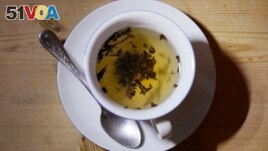An American scientist has started a tempest in a teapot by offering Britain advice on its favorite drink: tea.
Tempest in a teapot is an expression to describe a strong, noisy, and angry reaction over something small or unimportant.
Michelle Francl is a chemistry professor at Bryn Mawr College, outside of Philadelphia, Pennsylvania. She said tea drinkers should add a little salt to make a perfect cup of tea.

FILE - A cup of black tea with a spoon and tea leaves in London, on Aug. 29, 2022. An American scientist has started a tempest in a teapot by offering Britain advice on its favorite drink: tea. (AP Photo/Alastair Grant, File)
That advice is included in her book Steeped: The Chemistry of Tea. The book was published Wednesday by the Royal Society of Chemistry.
Mixing tea with salt water has never gone well for British-American relations. In 1773, American colonists in Boston, Massachusetts, were angry at Britain for adding more taxes to raise money. So they dumped British tea into the sea. The event became known as the Boston Tea Party. It led to the start of the American Revolution.
Francl's suggestion caused outrage among tea lovers in Britain. They see Americans as coffee drinkers who know nothing about tea. And they think if Americans drink tea at all, they just heat water in a microwave.
"Don't even say the word ′salt′ to us..." said the etiquette guide Debrett's on the social media service X, formerly known as Twitter.
Even the U.S. Embassy in London joined the tempest in a teapot. In a social media post, it promised "the good people of the U.K. [United Kingdom] that the unthinkable notion of adding salt to Britain's national drink is not official United States policy."
"Let us unite in our steeped solidarity and show the world that when it comes to tea, we stand as one," the embassy said in the post. "The U.S. Embassy will continue to make tea in the proper way - by microwaving it," it added.
The embassy later said that the post was "a lighthearted play on our shared cultural connections" rather than an official press release.
Francl's book Steeped, however, is no joke. The advice, its publisher said, comes from three years of research and experimentation with more than 100 chemical compounds. The book, the publisher added, "puts the chemistry to use with advice on how to brew a better cup."
Francl said adding a small amount of salt — not enough to taste — makes tea seem less bitter. This is because "the sodium ions in salt block the bitter receptors in our mouths," she explained.
She also suggests making tea in a warmed pot, shaking the tea bag around, and serving tea in a short and wide cup to keep the heat. And she says milk should be added to the cup after the tea and not before – another issue that often divides tea lovers.
Francl has been surprised by the reaction to her book in Britain.
"I kind of understood that there would hopefully be a lot of interest," she told The Associated Press. "I didn't know we'd wade into a diplomatic conversation with the U.S. Embassy."
I'm Ashley Thompson.
Jill Lawless reported this story for The Associated Press. Hai Do adapted the story for Learning English.
________________________________________________
Words in This Story
outrage - n. extreme anger, a strong feeling of unhappiness
microwave - n. kitchen device to cook and heat food using electromagnetic energy
etiquette - n. rules showing the proper and polite way to behave
lighthearted - adj. not serious
bitter - adj. having stong and unpleasant flavor, the opposite of sweet
wade - v. to become involved in a discussion, situation...
